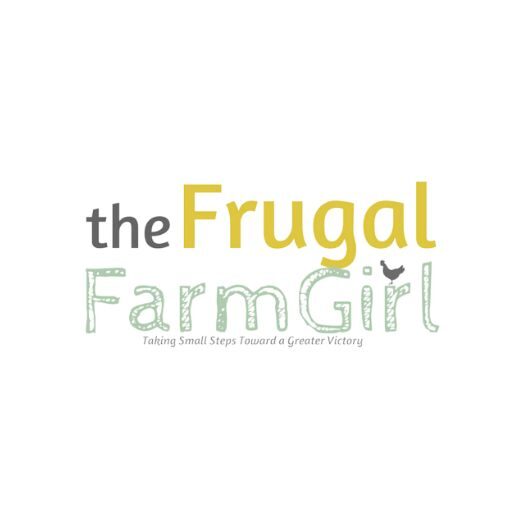As a fellow homesteader and goat owner, I know firsthand the importance of finding the right animal feed, especially during the harsh winter months.
Not only do you want something that will keep your goats healthy and happy, but you also want to keep your feed costs down without sacrificing quality. I’m excited to share that the best hay to feed goats in winter is fairly easy to find, and if you can’t find it locally sourced, you have other options.
How does a goat eat? Goats are ruminant animals with a four-chamber stomach designed to digest hay and other roughage.
Their digestive system relies on microbes to break down this material, making their diet essential to their overall health. This is why providing them with hay high in protein, vitamins, and minerals is critical.

What Is Hay?
First, the basics: what exactly is hay? Hay is dried grass or legumes harvested in the summer and stored for winter feeding.
It’s an essential component of a goat’s diet and provides the necessary roughage for their digestive system. Different types of hay are available, but alfalfa hay is considered the best for winter feed.

Difference between Straw and Hay
While straw has been called hay by many, it is important to understand the difference between the two. Hay is used for feeding animals because it contains the entire plant: the stem, leaf, and seed head.
On the other hand, straw is used more in gardening and bedding because it does not contain the plants’ seeds.
This will keep weeds and other unwanted growth out of the garden, allowing the intended plant to grow. Feeding straw to goats does not provide the same nutrients as hay, so it should not be used as a replacement.

What are the different types of hay for goats?
There are many types of hay for goats, including timothy hay, orchard grass, and clover. However, alfalfa hay tops the list.
Alfalfa hay is made from lucerne, a legume hay high in calcium, protein, and other essential nutrients. This makes it ideal for feeding goats who are pregnant and lactating.
I also feed alfalfa hay to my does for a higher milk production.
Different Cuts of Hay
There are three primary cuts of hay: first-cut, second-cut, and third-cut hay. First-cut hay is harvested at the beginning of the summer, and while it’s high in fiber, it’s lower in protein and nutrients.
Second-cut hay is the most popular and contains more leaves, increasing protein and essential vitamins. Ideally, this is the kind of hay we like, but depending on the weather and demand from our local farms, it’s not as easy to come by for some years.
Third-cut hay is the most tender and fragrant, with the most leaves, but it’s not as nutritionally dense as first or second-cut hay.

What is the Best Cut of Hay for Goats In Winter?
As a goat farmer, making the most of your resources during the winter months is essential. Finding good quality hay is essential to caring for goats. If you are new to raising goats, try to find where you will buy your hay before you bring your goats home.
An easy way to find good hay is to use Facebook livestock groups and local groups to find farmers who sell hay.
Alfalfa hay Is a good choice for your goat herd’s dietary needs. Not all goats need alfalfa hay. Wethers can get away with first cut hay; of course, they would love the second cut hay, but it’s unnecessary. I tend to give our whether and bucks first cut and very little grain in the winter.
Usually, a bale of alfalfa hay is cheaper than the pellets you find in a feed store or what a feed store bale of alfalfa hay will cost.
With higher mineral, vitamin, and protein content than most grasshays, alfalfa is a great option for lactating goats or pregnant goats.
Plus, it’s the popular choice that provides enough protein for lactating. If your goats have only been eating a first-cut type of hay, add a small amount of the richer hay, like Alfalfa, to their diet.
I loved it when our surrounding farm fields were alfalfa fields. What the farmers left in the field was a perfect amount to feed my does after birthing.
The Best Hay for Meat Goats
If you’re raising meat goats, second-cut hay is the best hay for them. This is because most goats prefer it to first-cut hay, and it encourages them to eat more, helping them maintain a healthy weight at a fast-growing rate.
Second-cut hay is also higher in protein and nutrients than first-cut hay, making it an excellent choice for meat goats. If you find your goat’s body weight on the low end of the weight scale, introducing second-cut hay can help them establish a better weight.
Why Feed Alfalfa Hay In Winter
Most of us have no grass growing for several months during the fall and winter. This means we must supplement our goat’s diet with more protein and calories to stay warm.
When temperatures dip into the teens and below, goats require more energy to keep warm, which means more feed.
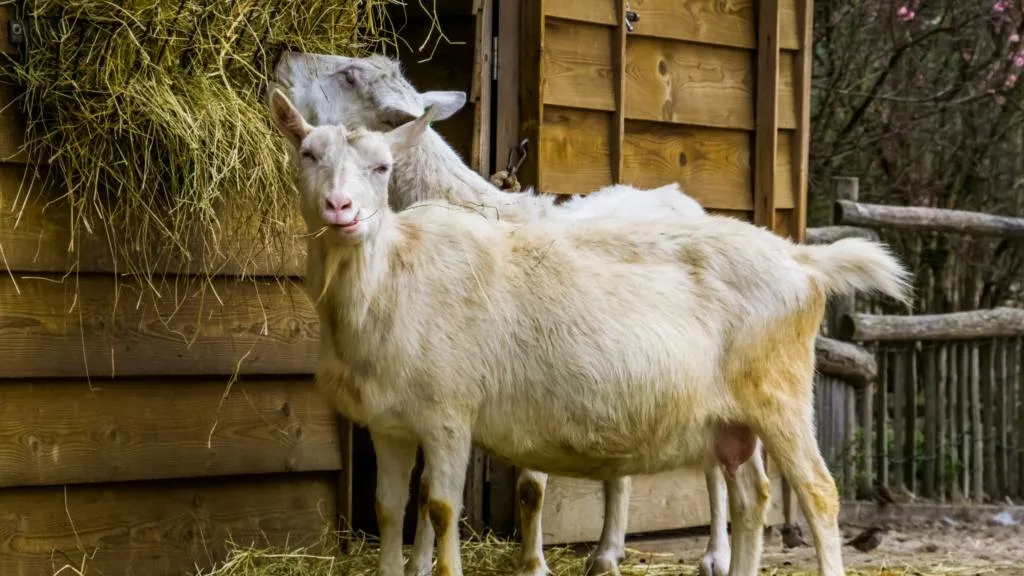
Best Hay Feeder
There are so many different types of hay feeders available for your goats. I did an entire post on the hay feeders we use on our farm and others, depending on your setup and how many goats you have.
Goats are known for wasting hay, so some people will spend the extra money to have feeders with a tray at the bottom. Whatever the goats don’t eat on the ground, the sheep will, and then I’ll scoop that up and give it to the pigs.
Sample Hay Analyses
When choosing hay for your goats, obtaining sample hay analyses from local distributors is the best way. These reports provide nutritional data on the hay, including its protein, fiber, moisture, and calcium levels.
By analyzing the results, you can determine its nutritional value and decide if it will meet your goat’s needs.
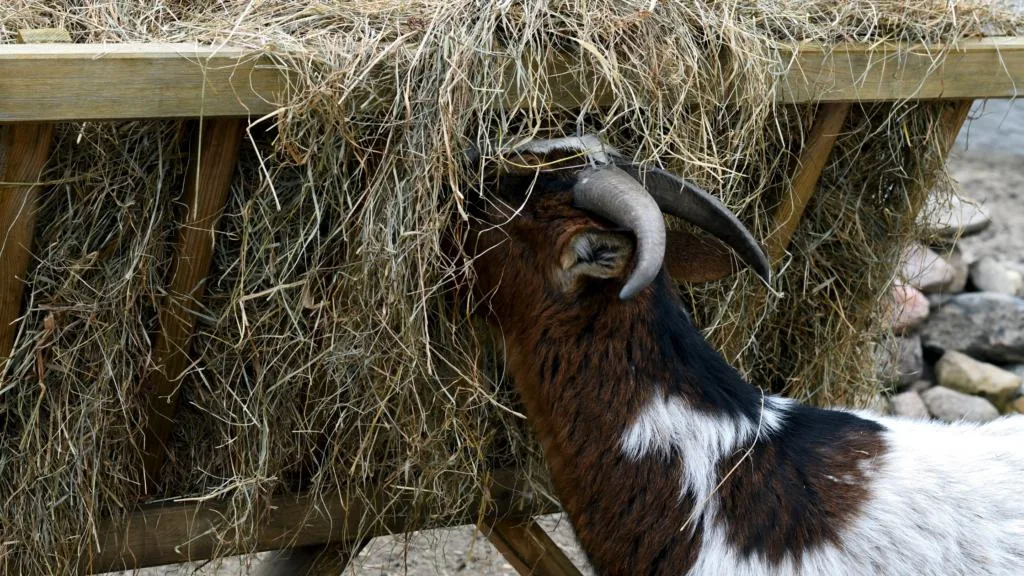
What Goats Need to Survive Winter
Goats are sensitive to the cold, which makes their winter feed even more important. They require high-quality hay that is rich in protein and essential minerals to keep them healthy.
Providing alfalfa hay to your goats during the winter months not only keeps them healthy but it also boosts their immune system, supporting their overall well-being.
Another way to increase protein and fat in your got’s diet is giving them black oil sunflower seeds. I do this at the end of winter or early spring after most does have weaned their kids. Their bodies seem to take a beating, and then this time of year, they can carry a higher worm lead with the wetness.
I find that the springtime is when I’m constantly checking and reassessing what the goats need the most and updating it in my livestock planner.
Problems with Hay
One issue when feeding hay to your toast is moldy hay. Dust is another problem; some goats are more sensitive than others.
When stored improperly, hay can accumulate moisture and dust, leading to respiratory problems in goats.
To counteract this, store your hay in a dry, well-ventilated space to keep it fresh and prevent the formation of mold spores.
Urinary Cacli is a fear for many new goat owners. I know it’s all I could think about when we first brought our goats home. Our wether ( a castrated male goat) is now five and so far so good. If you have a wether limit their grain, they don’t need it.
Don’t Forget the Minerals
Alfalfa hay does contain high levels of calcium, which can lead to an imbalance in minerals if it’s the only feed your goats receive.
Providing your goats with free-choice minerals to supplement their diet is essential. They should have access to loose minerals, vitamins, and salt all year round, even during winter.
I usually grab a bag at Tractor Supply because it was the cheapest until I tried the mineral block.
A frugal tip: give your Christmas tree or ask others for their Christmas tree when they are done ( if it hasn’t been spraying with anything) to give to your goats! They love them and when they’ve eaten all the needles and some branches off, it works as a great scratching spot for the goats.
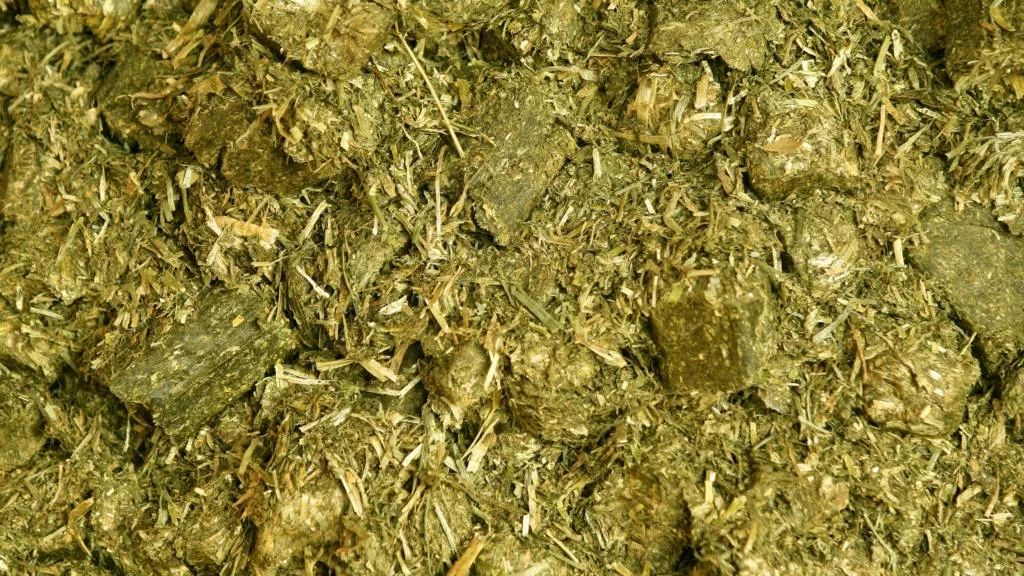
Alfalfa Pellets for Goats
In addition to feeding alfalfa hay, pellets are an excellent option for supplementing your goats’ winter diet. They’re easy to feed and store and contain the same nutrients as alfalfa hay but condensed. When feeding pellets, ensure your goats have adequate clean water to aid digestion.
I always give black sunflower seeds for extra butterfat in the milk while milking my goats. Everyone on the farm, from the chickens to the pigs, loves these, so it’s a nice treat to have on hand.
If you are new to goats, they can be picky with their water consumption, which is important to watch when feeding them grain. If they have a bunch of hay or someone pooped in the bucket, they tend not to drink it.
This is something we will have to do this year since the regular farmers we buy hay from didn’t have any second-cutting hay for us.
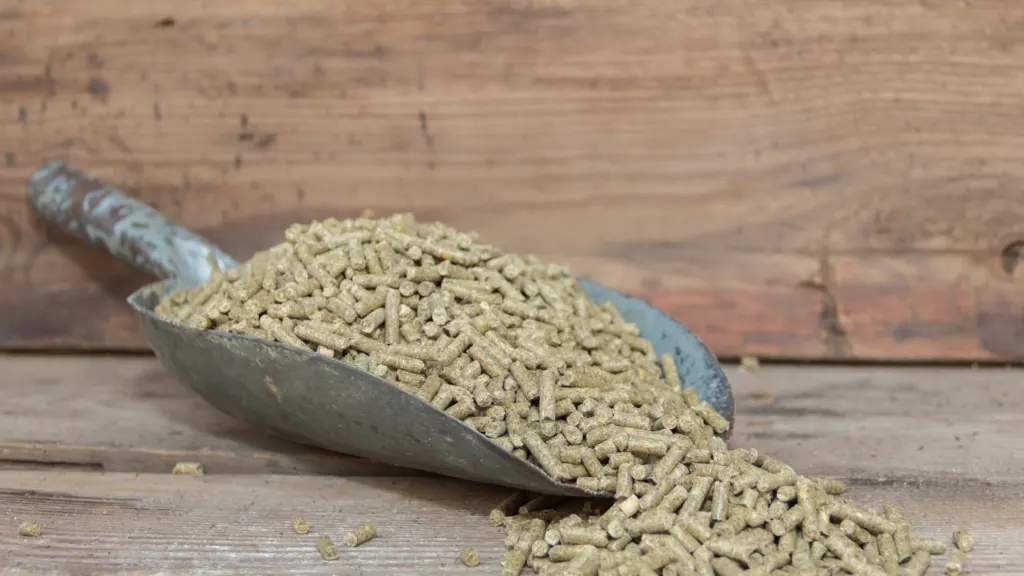
Balance is Key, Even with the Best Hay for Goats
Lastly, keeping your goat’s diet balanced is important, even with the best hay for winter feeding. Offering various feed options, including hay, grain, and supplements, can help prevent nutrient deficiencies and provide a range of nutrients.
Always practice moderation when feeding your goats to prevent overeating, which can lead to health problems. Giving your goats a fresh pasture helps ensure they are getting a well-balanced diet, so take the winter time to let those pastures rest. I like to alternate pasture every few weeks with the herd. And remember, spring is around the corner!
You never want to offer a free choice of grain because too much of a good thing can be bad. Even feeding alfalfa too much will cause health problems.
Knowing what to feed your goats during winter can significantly impact their overall health and well-being. Feeding alfalfa hay provides essential nutrients and supports their immune system during the colder months.
Always remember to keep their diet balanced, supplement it with minerals, and practice moderation in feeding. Not only will your goats thrive on this winter feed, but your wallet will also appreciate the cost savings without sacrificing quality.
